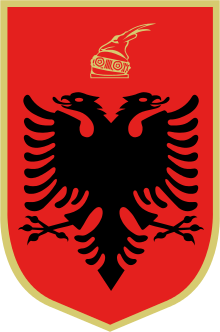Battle of Deçiq
| Battle of Deçiq | |||||||
|---|---|---|---|---|---|---|---|
| Part of Albanian Revolt of 1911 | |||||||
| |||||||
| Belligerents | |||||||
|
|
| ||||||
| Commanders and leaders | |||||||
|
Ded Gjo Luli Sokol Baci Pretash Zeka | Shefket Turgut Pasha | ||||||
| Strength | |||||||
| 3.280 soldiers |
27.000 soldiers (34 infantry battalions) 20 heavy machine guns 24 mountain cannons | ||||||
The Battle of Deçiq (Albanian: Beteja e Deçiqit) marked the beginning of the turning point for Albanian liberty.[1]
Location and background
The battle took place near Deçiq, south of the town of Tuzi (today in Montenegro). Tuzi is the town center for the region of Malësia that lies within Montenegro, whereas the capital town for all of Malësia is Koplik. Malësia is simply translated to "The Great Highlands", which is a well depicted name due to the rough mountainous terrain within this region. The region of Malësia is mostly under the Roman Catholic faith. The tribesman of Malësia are known as Malësor, meaning Highlander.
The battle
The main portion of the battle took place between Tuzi and Koplik (Albania), where the Malësors went against thousands of Turks. Koplik is the largest town in Malësia, right across the border with Montenegro is Tuzi. As the fighting proceeded, both armies decided to move north into the town of Tuzi, where the battle ended.
Outcome
In 1913, at the Treaty of London, the powers of Europe decided to annex half the land of Malësia to Montenegro, wheres the rest remained in Albania. Tuzi, along with the tribes of half of Hoti (Traboini), Grudë, Triesh, and Koja e Kuçit went to Montenegro. Kelmendi, the other half of Hoti (Rapsha), Kastrati, Shkreli, and the town of Koplik remained in Albania, but certain parts of Kelmendi such as Vuthaj, Martinaj, Plav, Gusinje, went to Montenegro and Rugova was annexed to Serbia.
Notable warriors
- Ded Gjo Luli Dedvukaj of Traboin
- Sokol Baci of Gruda
- Pretash Zeka Ulaj of Koja
- Prek Cali of Kelmend
- Gjeto Toma Kolçaj of Koja
- Mehmet Shpendi of Shala
- Tringe Smajl Martini of Gruda
- Palok Traboini 1888-1951, Secretary of Ded Gjo Lul, teacher, and owner of the Albanian Flag of Deçiq, which he brought from Vienna through Dalmatia.
References
- ↑ Nikprelaj, Gjergj (5 January 2006). "DEDE GJO LULI, MBROJTESI FISNIK I TROJEVE SHQIPTARE" (in Albanian). Koha Jone. Retrieved 20 September 2010.
Further reading
- Martini, Luigj, 2005 "Prek Cali, Kelmendi Dhe Kelmendasit" ISBN 9994334077 Publisher: Camaj-Pipaj
- Tallon, James "The failure of Ottomanism: The Albanian Rebellions of 1909--1912" |url=http://gradworks.umi.com/35/26/3526980.html
